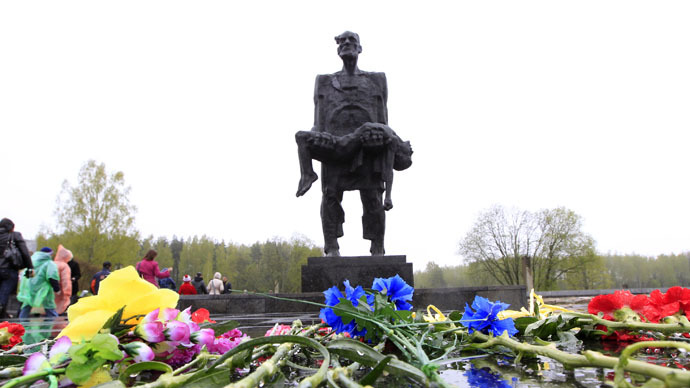Alleged Nazi war criminal dies in Canada & escapes justice

An alleged 93-year-old Nazi war criminal charged by Russia with genocide earlier this month has died in Canada, his lawyer announced. The man was second on the list of Most Wanted Nazi War Criminals, according to the Simon Wiesenthal Center.
Vladimir Katriuk, who was accused of being a key participant in one of the worst mass killings during World War II, the 1943 Khatyn massacre, died after a long illness, lawyer Orest Rudzik said.
Russia charged Katriuk with genocide earlier in May and called on Canada to extradite the man.
The mass killing of civilians in the village of Khatyn (now part of Belarus) was carried out on March 22, 1943 by the 118th Schutzmannschaft Nazi battalion, which had many Ukrainian nationalist collaborators among its ranks. The Nazis drove inhabitants of the village from their houses into a barn, which they then set on fire. People who managed to get out of the barn were killed by machine gun fire. In total 147 people, including 75 children under 16, were killed.
.@bnaibrithcanada statement on the death of Nazi collaborator Vladimir Katriuk See: http://t.co/VE9fMr6NHvpic.twitter.com/8ejZ4XxUh3
— RussianEmbassyCanada (@RussianEmbassyC) May 29, 2015
Katriuk was suspected of manning a machine-gun during the Khatyn massacre, firing on people trying to escape from the burning building. He had always denied the accusations against him.
The Canadian government ignored the request for Katriuk’s extradition citing “Moscow’s annexation of Crimea” and “interference in Ukraine.”
The government’s stance stirred indignation on the part of the Canadian Centre for Israel and Jewish Affairs, which said modern day political disputes should not interfere with “the imperative to ensure justice is served with respect to Nazi atrocities perpetrated against Jews and others during WWII.”
“We call on the government of Canada to review this case and take the necessary steps to ensure that, if guilty, Katriuk be held accountable for war crimes committed in collaboration with the Nazi regime,” the Center’s CEO, Shimon Koffler Fogel said in a statement on Thursday.
READ MORE: CIA and FBI used 'over 1,000 ex-Nazis and collaborators' as spies during Cold War
Jewish groups had been hoping to see Katriuk on trial for a long time. Alla Gerber, the head of the Russian fund Holocaust spoke about the necessity of a trial in 2012.
After his alleged service in the Nazi army, Katriuk is said to have joined the French Foreign Legion. After the end of the war he stayed in France until 1951. He then immigrated to Canada, where he lived south of Montreal near the US border for more than six decades.
In 1999, the Federal Court of Canada claimed that Katriuk obtained his Canadian citizenship by providing false information, meaning he hadn’t told the authorities about his Nazi background. However, he wasn’t charged for any crimes because of lack of evidence. In 2007, the Cabinet of Canada decided not to revoke Katriuk’s citizenship.
Many ex-Nazis fled following the end of the war, finding shelter in the USA, Canada and Latin America. In October, 2014 the New York Times reported that the USA used over 1,000 ex-Nazis and collaborators as spies during the Cold War.












